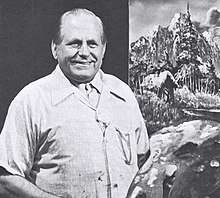Bill Alexander (painter)
William Alexander (born Wilhelm Alexander; 2 April 1915 – 24 January 1997), known as Bill Alexander on his TV show, was a German painter, art instructor, and television host. He was the creator and host of The Magic of Oil Painting (1974–82) television series that ran on PBS in the United States. He co-wrote The Art of Bill Alexander and … (1987–95), a series of books on wet-on-wet oil painting, based on different PBS series of the same form. He also taught the television painter Bob Ross his signature "quick" wet-on-wet technique.
Bill Alexander | |
|---|---|
 Alexander presenting The Magic of Oil Painting, which ran from 1974 until 1982 | |
| Born | Wilhelm Alexander [1] 2 April 1915 |
| Died | 24 January 1997 (aged 81) |
| Nationality | German |
| Known for |
|
Early life
Wilhelm Alexander was born in East Prussia (in what is now Poland). His family fled to Berlin during World War I. Apprenticed as a carriage maker, Alexander was drafted into the Wehrmacht during World War II. Captured by Allied troops, he painted portraits of Allied officers' wives and he soon made his way to the United States.[2]
After World War II, Alexander became a refugee and professional painter, pioneering the modern "quick" version of the 15th century wet-on-wet technique, and moving to North America. Later, now known as Bill, Alexander became a TV host on his own painting education TV show.[1]
Alexander is best known for the television program The Magic of Oil Painting (1974–1982), which ran on PBS in the United States. Alexander teamed with other artists on several different PBS series of the format The Art of Bill Alexander and … that ran from 1984–1992, starting with Lowell Speers and including Robert Warren. Alexander also teamed with painters Sharon Perkins and Diane André. Alexander and the second featured artist would alternate episodes, with both painters using the wet-on-wet method. This series was turned into a series of books "as seen on television".
Relations with Bob Ross
TV host and prolific painter Bob Ross studied under Alexander, from whom he learned his wet-on-wet technique, a method of painting rapidly using progressively thinner layers of oil paint.[3] Ross mentioned in the very first episode of the The Joy of Painting that he had learned the technique from Bill Alexander, calling it "the most fantastic way to paint that you've ever seen".[3] Ross also dedicated the first episode of the second season to Alexander, explaining that "I feel as though he gave me a precious gift, and I'd like to share that gift with you [the viewer]".[4]
As Ross's popularity grew, his relationship with Alexander became increasingly strained. In a 1991 interview with The New York Times, Alexander said of Ross, "He betrayed me. I invented 'wet on wet'. I trained him, and he is copying me -- what bothers me is not just that he betrayed me, but that he thinks he can do it better." Alexander refers here to the fact that Bob Ross used some of his individual patter like "happy little trees" and borrowed some of his unique peculiarities.[5]
Art historians have pointed out that the "wet-on-wet" (or alla prima) technique actually originated in Flanders during the 15th century, and was used by Frans Hals, Diego Velázquez, Caravaggio, Paul Cezanne, John Singer Sargent, and Claude Monet, among many others. But actually, Alexander invented the step of priming the canvas with a liquid white paint (before starting to paint) and he also designed the style of palette knife employed, which is larger, firmer, and has one straight edge. Both inventions are fundamental for his wet-on-wet technique. [6][7]
Bibliography
- W. Alexander (The Magic of Oil Painting Artist) (1983). The Bill Alexander Story: An Autobiography. Kendall Hunt. ISBN 0840329903.
- W. Alexander (1989). Secrets to the Magic of Oil Painting. Walter Foster.
- W. Alexander (1990). The Magic of Oil Painting. Walter Foster. ISBN 0929261372.
- William Alexander (1997). Landscapes: Learn to Paint Step by Step. Walter Foster. ISBN 0929261607.
See also
References
- Robert Phillip Jones (27 October 2015). "Bob Ross, Bill Alexander - beyond the pale?". painters-online.co.uk. Painters Online. Archived from the original on 15 December 2018. Retrieved 2 December 2017.
- Alexander, William (1983). The Bill Alexander Story: An Autobiography. Dubuque, IA: Kendall Hunt Pub Co. p. 244. ISBN 0-8403-2990-3.
- Bob Ross - A Walk in the Woods (Season 1 Episode 1) on YouTube
- "The Joy of Painting with Bob Ross: Meadow Lake", Season 2, Episode 1, 1 November 1983 on YouTube
- Stanley, A. (December 22, 1991). "Bob Ross, the Frugal Gourmet of Painting". The New York Times. Retrieved December 24, 2015.
- Taubes, F. Mastery of Alla Prima Painting. F&W Pub.(1980), pp. 22-4. ISBN 0891340297.
- Gury, A. Alla Prima: A Contemporary Guide to Traditional Direct Painting. Watson-Guptill (2009), p. 16. ISBN 0823098346.